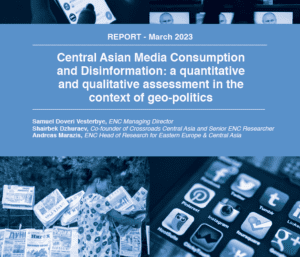The report presents a rapid media consumption assessment in Central Asia. It tells the reader what information – and disinformation – Central Asians consume, as well as the reasons why they consume it. How do recent international and regional geo-political events impact their media choices and what sources do they come from?
From the ongoing Russian invasion in Ukraine to controversial domestic events in the region, including violent state response to protests and the unresolved border issues between Kyrgyzstan and Tajikistan, this report examines the critical role of information and disinformation in shaping public awareness and response to such processes.
The overarching goal of the study is to enrich our understanding of media consumption patterns in the region, with specific attention to disinformation and audiences most susceptible to it: young, elderly, and linguistic minorities. Focus is placed on practical components, including demographic trends both regionally, and across each country, as well as factors like sources, channels, language preferences and new trends in media usage.
This study was conducted by the European Neighborhood Council (ENC) within the project “Resilience and Engagement with Varied Information for a Vibrant Environment (REVIVE)”, funded by the European Union and implemented by Internews. Its contents are the sole responsibility of European Neighborhood Council (ENC) and do not necessarily reflect the views of the European Union or Internews.
